完成时态的讲解与练习
现在完成时讲解(含讲解及习题)
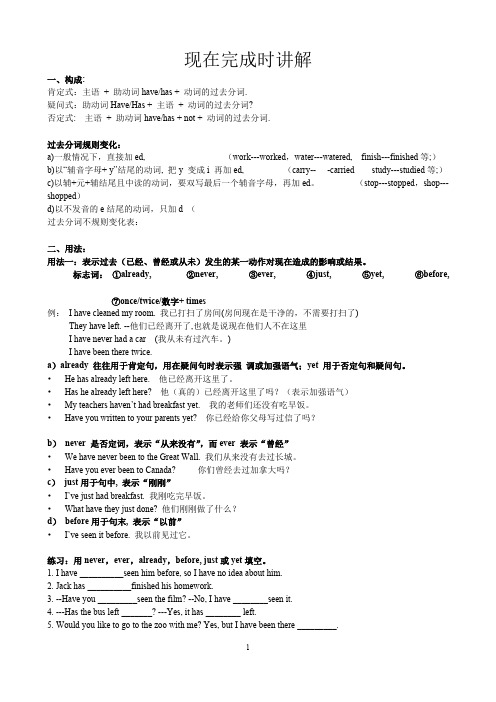
现在完成时讲解一、构成:肯定式:主语+ 助动词have/has + 动词的过去分词.疑问式:助动词Have/Has + 主语+ 动词的过去分词?否定式: 主语+ 助动词have/has + not + 动词的过去分词.过去分词规则变化:a)一般情况下,直接加ed, (work---worked,water---watered, finish---finished等;)b)以“辅音字母+ y”结尾的动词, 把y 变成i 再加ed, (carry---carried study---studied等;)c)以辅+元+辅结尾且中读的动词,要双写最后一个辅音字母,再加ed。
(stop---stopped,shop---shopped)d)以不发音的e结尾的动词,只加d (过去分词不规则变化表:二、用法:用法一:表示过去(已经、曾经或从未)发生的某一动作对现在造成的影响或结果。
标志词:①already, ②never, ③ever, ④just, ⑤yet, ⑥before,⑦once/twice/数字+ times例:I have cleaned my room. 我已打扫了房间(房间现在是干净的,不需要打扫了)They have left. --他们已经离开了,也就是说现在他们人不在这里I have never had a car (我从未有过汽车。
)I have been there twice.a)already 往往用于肯定句,用在疑问句时表示强调或加强语气;yet 用于否定句和疑问句。
•He has already left here. 他已经离开这里了。
•Has he already left here? 他(真的)已经离开这里了吗?(表示加强语气)•My teachers haven’t had breakfast yet. 我的老师们还没有吃早饭。
•Have you written to your parents yet? 你已经给你父母写过信了吗?b)never 是否定词,表示“从来没有”,而ever 表示“曾经”•We have never been to the Great Wall. 我们从来没有去过长城。
现在完成时专项讲解与练习
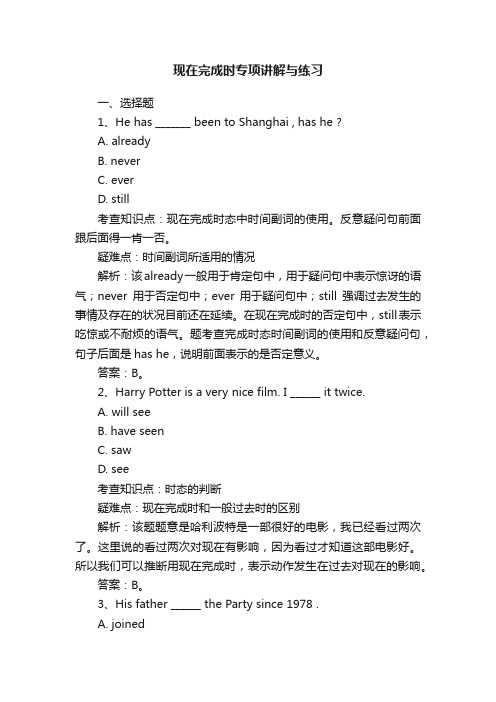
现在完成时专项讲解与练习一、选择题1、He has _______ been to Shanghai , has he ?A. alreadyB. neverC. everD. still考查知识点:现在完成时态中时间副词的使用。
反意疑问句前面跟后面得一肯一否。
疑难点:时间副词所适用的情况解析:该already一般用于肯定句中,用于疑问句中表示惊讶的语气;never用于否定句中;ever用于疑问句中;still强调过去发生的事情及存在的状况目前还在延续。
在现在完成时的否定句中,still表示吃惊或不耐烦的语气。
题考查完成时态时间副词的使用和反意疑问句,句子后面是has he,说明前面表示的是否定意义。
答案:B。
2、Harry Potter is a very nice film. I ______ it twice.A. will seeB. have seenC. sawD. see考查知识点:时态的判断疑难点:现在完成时和一般过去时的区别解析:该题题意是哈利波特是一部很好的电影,我已经看过两次了。
这里说的看过两次对现在有影响,因为看过才知道这部电影好。
所以我们可以推断用现在完成时,表示动作发生在过去对现在的影响。
答案:B。
3、His father ______ the Party since 1978 .A. joinedB. has joinedC. was inD. has been in考查知识点:时态的判断,瞬间动词转换成延续性动词。
疑难点:瞬间动词不能与表示持续时间段的时间状语连用,用在现在完成时态中与时间段连用需要作相应的变形。
解析:通过since 1978这个时间状语我们可以初步判断用现在完成时,所以排除A、C, 由于join 是瞬间动词,不能与时间段连用,得作相应的变形。
意为我父亲自从1978年就入党。
表示一种状态,join 得变成been in。
所以排除B。
答案:D。
4、—Do you know him well ?— Sure .We _________ friends since ten years ago.A. wereB. have beenC. have becomeD. have made考查知识点:瞬间动词跟延续性动词的变形。
初中现在完成时态讲解带练习

一.现在完成时的含义及用法1.现在完成时表示过去发生的动作,并对现在有影响。
2.现在完成时表示从过去一直持续到现在的动作或状态。
现在完成时的根本句型:肯定式:主语+ 助动词have/has + 动词的过去分词.否认式:主语+ 助动词have/has + not + 动词的过去分词.疑问式:助动词Have/Has + 主语+ 动词的过去分词?用法①现在完成时表示过去发生的动作,并对现在有影响。
Someone has broken the window. (窗户现在是坏的)I have already lost the key. (我现在没有钥匙)I haven’t read that book yet . (不了解书的内容)I have just cleaned my hands. (手是干净的)此时,现在完成时常与already(已经), yet(已经), just(刚刚),ever(曾经)等词连用,通常放在助动词之后,过去分词之前。
already: 常用于肯定句中.yet: 用于否认句,翻译为还没。
疑问句尾.翻译为已经1.你已经找到你的书了吗?2.他们在这个城市建了许多房子.3.Judy还没到达.4.你吃过早饭了吗?用法②现在完成时表示从过去一直持续到现在的动作或状态。
She has learned English for 5 years.He has lived in Beijing since ( 自从)he was born .Have you stayed here since ( 自从) 3 o’clock?for+ 时间段since+时间点, since+ 句子①Mr. Brown has had his TV _____15 years.②I’ve taken driving lessons _______last month.③My sister has had her cell phone _____a month .④My friends haven’t visited me _______ my birthday.⑤We haven’t used our car _____a long time .⑥She hasn’t h ad a good cup of coffee ____ years.⑦Tom has worn glasses _______he was 7 years old.二.have been 与have gone 的用法比拟have been to “到过,去过〞,表示曾经到过某处,但现在人不在那儿。
高中现在完成时讲解与练习(非常详细)
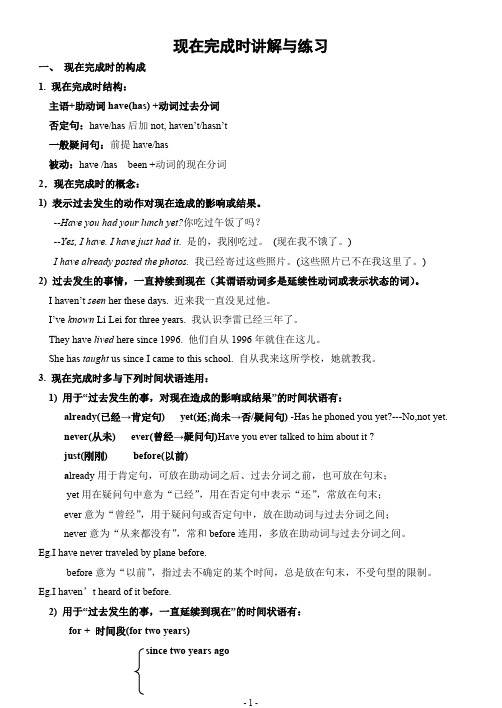
现在完成时讲解与练习一、现在完成时的构成1. 现在完成时结构:主语+助动词have(has) +动词过去分词否定句:have/has后加not, haven’t/hasn’t一般疑问句:前提have/has被动:have /has been +动词的现在分词2.现在完成时的概念:1) 表示过去发生的动作对现在造成的影响或结果。
--Have you had your lunch yet?你吃过午饭了吗?--Yes, I have. I have just had it. 是的,我刚吃过。
(现在我不饿了。
)I have already posted the photos. 我已经寄过这些照片。
(这些照片已不在我这里了。
)2) 过去发生的事情,一直持续到现在(其谓语动词多是延续性动词或表示状态的词)。
I haven’t seen her these days. 近来我一直没见过他。
I’ve known Li Lei for three years. 我认识李雷已经三年了。
They have lived here since 1996. 他们自从1996年就住在这儿。
She has taught us since I came to this school. 自从我来这所学校,她就教我。
3. 现在完成时多与下列时间状语连用:1) 用于“过去发生的事,对现在造成的影响或结果”的时间状语有:already(已经→肯定句) yet(还;尚未→否/疑问句) -Has he phoned you yet?---No,not yet.never(从未) ever(曾经→疑问句)Have you ever talked to him about it ?just(刚刚) before(以前)a lready 用于肯定句,可放在助动词之后、过去分词之前,也可放在句末;yet用在疑问句中意为“已经”,用在否定句中表示“还”,常放在句末;ever意为“曾经”,用于疑问句或否定句中,放在助动词与过去分词之间;never意为“从来都没有”,常和before连用,多放在助动词与过去分词之间。
现在完成时讲解(含讲解及习题)
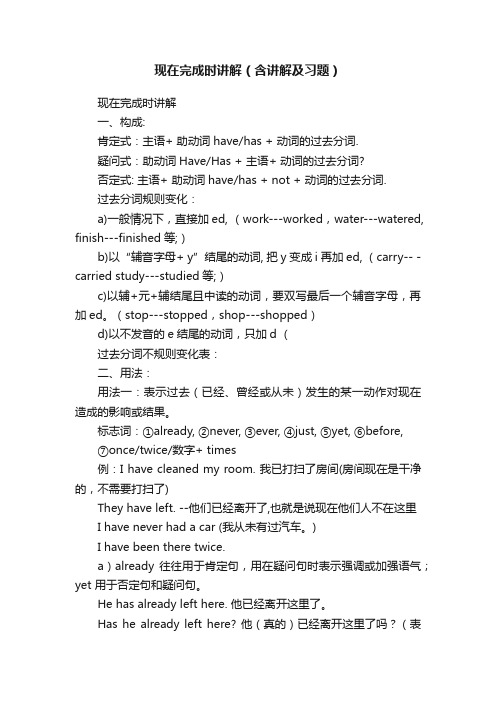
现在完成时讲解(含讲解及习题)现在完成时讲解一、构成:肯定式:主语+ 助动词have/has + 动词的过去分词.疑问式:助动词Have/Has + 主语+ 动词的过去分词?否定式: 主语+ 助动词have/has + not + 动词的过去分词.过去分词规则变化:a)一般情况下,直接加ed, (work---worked,water---watered, finish---finished等;)b)以“辅音字母+ y”结尾的动词, 把y 变成i 再加ed, (carry-- -carried study---studied等;)c)以辅+元+辅结尾且中读的动词,要双写最后一个辅音字母,再加ed。
(stop---stopped,shop---shopped)d)以不发音的e结尾的动词,只加d (过去分词不规则变化表:二、用法:用法一:表示过去(已经、曾经或从未)发生的某一动作对现在造成的影响或结果。
标志词:①already, ②never, ③ever, ④just, ⑤yet, ⑥before,⑦once/twice/数字+ times例:I have cleaned my room. 我已打扫了房间(房间现在是干净的,不需要打扫了)They have left. --他们已经离开了,也就是说现在他们人不在这里I have never had a car (我从未有过汽车。
)I have been there twice.a)already 往往用于肯定句,用在疑问句时表示强调或加强语气;yet 用于否定句和疑问句。
He has already left here. 他已经离开这里了。
Has he already left here? 他(真的)已经离开这里了吗?(表示加强语气)My teachers haven’t had breakfast yet. 我的老师们还没有吃早饭。
Have you written to your parents yet? 你已经给你父母写过信了吗?b)never 是否定词,表示“从来没有”,而ever 表示“曾经”We have never been to the Great Wall. 我们从来没有去过长城。
小学英语语法之现在完成时讲解练习及答案

小学英语语法之现在完成时讲解练习及答案现在完成时是英语语法中的一种时态,用来表示过去发生的动作与现在的相关性。
在这里,我们将为小学生介绍并提供一些现在完成时的讲解练及答案。
一、现在完成时的构成现在完成时由助动词"have/has"与过去分词形式构成。
具体构成如下:- 主语 + have/has + 过去分词二、现在完成时的用法1. 表示过去动作对现在造成的影响或结果。
例如:- I have finished my homework.我已完成作业。
- He has broken his leg.他摔断了腿。
2. 表示过去开始,一直延续到现在的动作。
例如:- She has lived in London since 2010.她自2010年以来一直住在伦敦。
3. 表示已经发生的经历或已经做过的事情。
例如:- Have you ever visited Paris?你有没有去过巴黎?- I have never seen such a beautiful sunset.我从未见过如此美丽的日落。
三、练题及答案1. 选择正确的动词形式填空:- I (have/has) finished my lunch.- She (have/has) studied English for five years. - They (have/has) been to China before.答案:- have- has- have2. 根据提示完成句子,使用现在完成时:- We (travel) to Japan.- He (not finish) his homework yet.- (You/visit) any famous landmarks?答案:- have traveled- has not finished- Have you visited以上是关于小学英语语法之现在完成时的讲解练习及答案。
现在完成时态讲解及练习
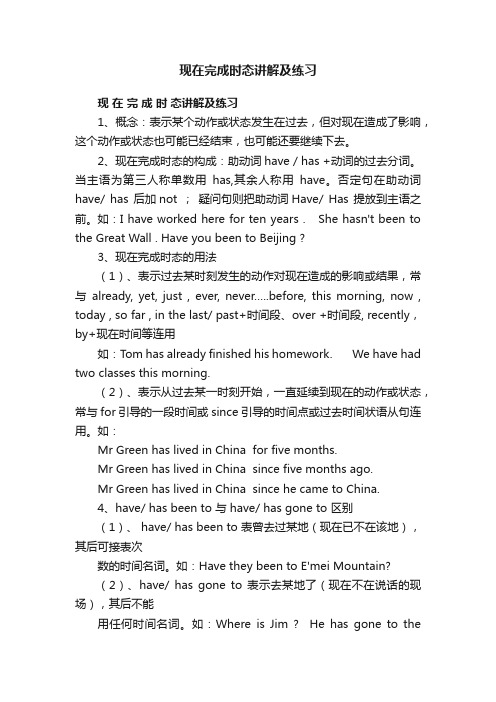
现在完成时态讲解及练习现在完成时态讲解及练习1、概念:表示某个动作或状态发生在过去,但对现在造成了影响,这个动作或状态也可能已经结束,也可能还要继续下去。
2、现在完成时态的构成:助动词have / has +动词的过去分词。
当主语为第三人称单数用has,其余人称用have。
否定句在助动词have/ has 后加not ;疑问句则把助动词Have/ Has 提放到主语之前。
如:I have worked here for ten years . She hasn't been to the Great Wall . Have you been to Beijing ?3、现在完成时态的用法(1)、表示过去某时刻发生的动作对现在造成的影响或结果,常与already, yet, just , ever, never…..before, this morning, now , today , so far , in the last/ past+时间段、over +时间段, recently,by+现在时间等连用如:Tom has already finished his homework. We have had two classes this morning.(2)、表示从过去某一时刻开始,一直延续到现在的动作或状态,常与for 引导的一段时间或since 引导的时间点或过去时间状语从句连用。
如:Mr Green has lived in China for five months.Mr Green has lived in China since five months ago.Mr Green has lived in China since he came to China.4、have/ has been to 与 have/ has gone to 区别(1)、 have/ has been to 表曾去过某地(现在已不在该地),其后可接表次数的时间名词。
现在完成时讲解及练习(答案)

现在完成时讲解及练习(答案)初中英语主要时态系列(六)——现在完成时讲解及练习1现在完成时的基本结构肯定句:主语+have/has+动词的过去分词+其他否定句:主语+have/has+not+动词的过去分词+其他⼀般疑问句:Have/Has+主语+动词的过去分词+其他特殊疑问句:特殊疑问词+⼀般疑问句(have/has+主语+过去分词+其他)2现在完成时的⽤法1. 现在完成时⽤来表⽰过去已经完成的动作对现在造成影响或后果。
也就是说,动作或状态发⽣在过去但它的影响现在还存在,强调的是现在。
I have already posted the photo.我已经邮寄出了照⽚。
与此种⽤法连⽤的时间状语时⼀些模糊的过去时间状语,如already(肯定句句中), yet(否定句/疑问句句尾), just, before, recently,still, lately,never 等。
2. 现在完成时也可⽤来表⽰动作或状态发⽣在过去某⼀时刻,持续到现在并且有可能会继续持续下去。
He has lived here since 1978.⾃从1978年以来,他⼀直住在这⼉。
(动作起始于1978年,⼀直住到现在,可能还要继续住下去。
)此种⽤法常与for(+时间段),since(+时间点或过去时的句⼦)连⽤。
谓语动词必须是延续性动词。
有些瞬间动词可变为延续动词:go out----be out finish----be over open----be open die----be dead buy---have fall ill---be ill come back----be back catch a cold----have a cold3现在完成时常见考法对于现在完成时的考查,多以单选、句型转换或词语运⽤的形式考查学⽣在具体语境中灵活运⽤时态的能⼒。
在考试中,会让⼤家判断是否该⽤现在完成时,或者是考查“瞬间动词”不能与表⽰⼀段时间的状语连⽤”这⼀知识点。
- 1、下载文档前请自行甄别文档内容的完整性,平台不提供额外的编辑、内容补充、找答案等附加服务。
- 2、"仅部分预览"的文档,不可在线预览部分如存在完整性等问题,可反馈申请退款(可完整预览的文档不适用该条件!)。
- 3、如文档侵犯您的权益,请联系客服反馈,我们会尽快为您处理(人工客服工作时间:9:00-18:30)。
现在完成时的用法和练习题一. 用法:(1)动作发生在过去,强调对现在的影响。
与一般过去时的区别:强调过去—一般过去式强调对现在的影响---现在完成时。
试比较:I have lost my new book. 我把新书丢了。
(现在还未找到)I lost my new book yesterday. 我昨天把新书丢了。
(昨天丢的,现在找到与否没说明)My mother went to Shanghai.Where is your mother? ---She has gone to Shanghai.. I didn’t have breakfast.I haven’t have breakfast yet.(2)动作发生在过去某个不确定的时间,但对现在有某种影响和结果。
常被just、already、yet 等副词修饰。
如:--Have you had lunch yet? --Yes, I have. I've just had it.你(已经)吃午饭了吗?我刚刚吃过。
(现在我不饿了)(3)现在完成时表示未完成。
动作从过去延续到现在,还可能以后继续。
通常和带有for和since等表示一段时间的状语。
He has been in the army for ten years.I have studied English since 1980.(4)表示说话前发生过一次或多次的动作,现在成为一种经验,一般译为汉语“过”,表示次数:一次once; 二次: twice, 三次:three times…, ever, never等时间状语。
如:I have been to Beijing twice.我去过北京二次。
I have been to Shanghai twice.She has watched this film three times.I have never seen more beautiful girl than she.练习1. 我已经在深圳住了十年。
___________________________________2. 我的叔叔自从1960年以来都在寻找他的女儿。
___________________________________3. 我踢足球已经有两年了。
___________________________________4. 我自从1996年就认识玛丽___________________________________5. He has lived in Nanjing ________ the year before last.6. I’ve known him __________ we were children.7. Our teacher has studied Japanese _________ three years.8. She has been away from the city ___________ about ten years.9. It’s about ten years __________ she left the city.二. 构成:(1) 肯定句:(2) 否定句:...have/has not done(3) 一般疑问句:Have/ Has ... done ....?Yes, ... have/has. No, ...have/has not.(4) 常用的时间状语有:或不加任何的时间状语,但不能和表示过去的时间状语连用.A.already和yet区别:I have already finished my homework.already用在_______,位于_______。
“已经”Have you finished your homework yet?yet用在_______和________中,位于_______。
“仍然,还,已经”B.for 与since区别: for +时间段since+ 时间点I have lived in Changchun__________ two years.I have been here__________7 o'clock.用since和for填空1. ______ two years2._______ two years ago3. _______ last month4.______ 19995._______ yesterday6. _______ 4 o’clock7. ______ 4 hours 8._______ an hour 9. _______ we were children10. _____ lunch time 11.______ she left here 12, _______ she was very young13. _______ she was a child 14, _____ more than twenty years三. have been in,have been to与have gone to的用法区别(一).have(has) been in 表示“在某地呆多长时间”,常与表示一段时间的状语连用,如:since, for, how long 等。
例如:Mr. Brown has been in Shanghai for three days. 布朗先生来上海已经有三天了。
此外还有这些搭配:have been here (there) /at home (school) /on the farmhave been here (there) / abroad(二).have(has)been to表示“曾经去过某地”,现在已经不在那里了。
可与just, ever, never等连用,例如:I have just been to the post office. 我刚才去邮局了。
Mary has never been to the Great Wall. 玛丽从未去过长城。
Have you ever been to Hangzhou? 你曾经去过杭州吗?H ave(has) been to 后面可接次数,表示去过某地几次。
例如:I have been to Beijing three times. 我去过北京三次。
They have been to that village several times. 他们去过那个村庄好几次了。
(三).have(has) gone to意为“到某地去了”,表示到了某地或正在去某地的途中。
总之,说话时该人不在现场,一般不用第一、第二人称代词作句子的主语。
例如:----Where is Tom? ----He has gone to the bookshop. 汤姆在哪里?他到书店去Jack Johnson has gone to London. 杰克.约翰逊到伦敦去了。
练习I. 用have(has) been 或have(has) gone 填空。
A: Where ____________ Li Fei ___________?B: He ____________ to Hainan Island.A: How long ___________ he ___________ there?B: He _____________ there for three days.A: When will he come back , do you know?B: I’m afraid he won’t come back recently.A: Could you tell me the way to Hainan Island?B: Sorry, I _________ never ___________ there.A: How many times ___________ Li Fei __________ to that place?B: He _____________ there only once.II. 用have/has been to/in, have gone to及go的各种形式填空。
1) Where is Jack? He __________ his country.2) David ___________ the park just now.3) John __________ England since he came back.4) How long _________ have _________ this village?5) The Smiths __________ Beijing for years.6) ________ you ever _________ America? -- Yes, I _________ there many times.7) I _________ this school since three years ago.8) Where is Jim? He ________ the farm.9) When________ he _________? He __________ an hour ago.10) Would you like to _________ the zoo with me? ---Yes, but I _______ there before.11) Where _________ you _________ now? --- I ___________ the zoo.12) He often _________ swimming.13) __________ you __________ there last year?14) __________ they often __________ skating in winter?四.注意现在完成时中,非延续性动词不能与for和since引导的表示一段时间的状语连用,通常是用相应的延续性动词来代替。
(就是说:有for或since 的句子里,一定不能是非延续性代词,必须是延续性动词)。
例如:borrow → keep,buy → have,begin/start → be on, die → be dead,join → be in/be a member of-,come/arrive → be here/in, come/get back → be back,go/leave → be away(from),marry → be married(to),【练一练】在现在完成时中,在与_______和________引导的表示一段时间的状语连用时,通常是用相应的__________动词来代替__________.例如:borrow →___________,buy →_______________,begin/start →_____________, die →_______________,join →__________________,come/arrive →_____________ come/get back →_____________,go/leave →_____________,marry →_______________,练习1) The film began two minutes ago.The film ____ ____ ____ for ____ ____.2) I bought a pen two hours ago.I _________ _________ a pen for ________ __________.3) He left Fuzhou just now.He _______ ________ ________ _________ Fuzhou for five minutes.4)He came back two years ago.He _________ __________ _________ for __________ __________.5)He arrived Beijing five minutes ago.He ________ _________ _________ Beijing for _________ _________.①arrive at/in sw. get to/reach sw. come/go/move to sw.→ be in sw./at school/at home/on the farm/be here/be there1) He got to Beijing five minutes ago.He ________ _________ _________ Beijing for _________ _________.2) I moved to the USA last year.I ________ ________ __________ the USA since __________ __________.3) I went home yesterday.I _______ ________ _________ home for _________ __________.4) They came here last week.They _________ _________ here since _________ __________.②come/go back, return → be back come/go out → be out1) He came out two years ago.He _________ __________ _________ for __________ __________.2) We return to Fuzhou yesterday.We ________ ________ _________ to Fuzhou since __________.③be come → be1) I became a teacher in 2000.I ________ __________ a teacher for _________ _________.2) The river became dirty last year.The river _________ _________ dirty for _________ __________.④close → be closed ,open → be open1) The shop closed two hours ago.The shop ________ _________ _________ for _________ _________.2) The door opened at six in the morning.The door _____________ _______________ ________________ for six hours.⑤get up → be up ,die → be deadleave sw. → be away from sw.fall asleep/get to sleep → be asleepfinish/end → be over marry → be married1) I got up two hours ago.I ________ ________ ________ since ________ ________.2) He left Fuzhou just now.He _______ ________ ________ _________ Fuzhou for five minutes.3) My grandpa died in 2002.My grandpa _______ _______ ________for _______ ________.4) The meeting finished at six.The meeting ________ ______ ______ for six hours.5) I got to sleep two hours ago.I ________ _________ _________ since _________ __________.6) They married in 1990.They ________ _________ __________since _________.⑥start/begin to do sth. → do sth. begin → be on1) I began to teach at this school in 1995.I __________ ____________ at this school since ___________.2) The film began two minutes ago.The film ___________ ____________ _____________ for __________ ______________.⑦borrow → keep ,lose → not have ,buy → have ,put on → wearcatch/get a cold → have a cold ,get to know → know1) They borrowed it last week.They _________ _________ it since __________ __________.2) I bought a pen two hours ago.I _________ _________ a pen for ________ __________.3) I got to know him last year.I _________ __________ him since __________ __________.4) I put on my glasses three years ago.I __________ __________ my glasses for _________ _________.⑧have/has gone to → have been in1) He has gone to Beijing.He ________________ _____________ ______________ Beijing for two days.⑨join the league/the Party/the army→ be a league/a Party member/a soldier→ be a member of the league/the Party→ be in the league/the Party/the army1) He joined the league in 2002.He ________ _________ a _________ _________ for two years.He ________ __________ a __________ ___________ the __________ for two years. He ____________ ___________ ___________ the league for two years.2) My brother joined the army two years ago.My brother __________ __________ a ___________ for ___________ ___________. My brother ___________ ___________ in ____________ ___________ for two years.巩固练习一.根据提示完成句子1.他的爷爷去世三年了。
